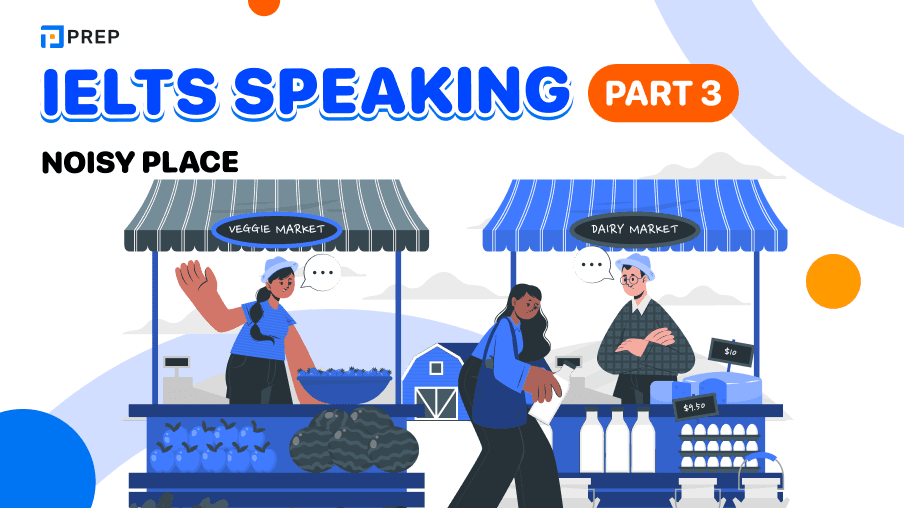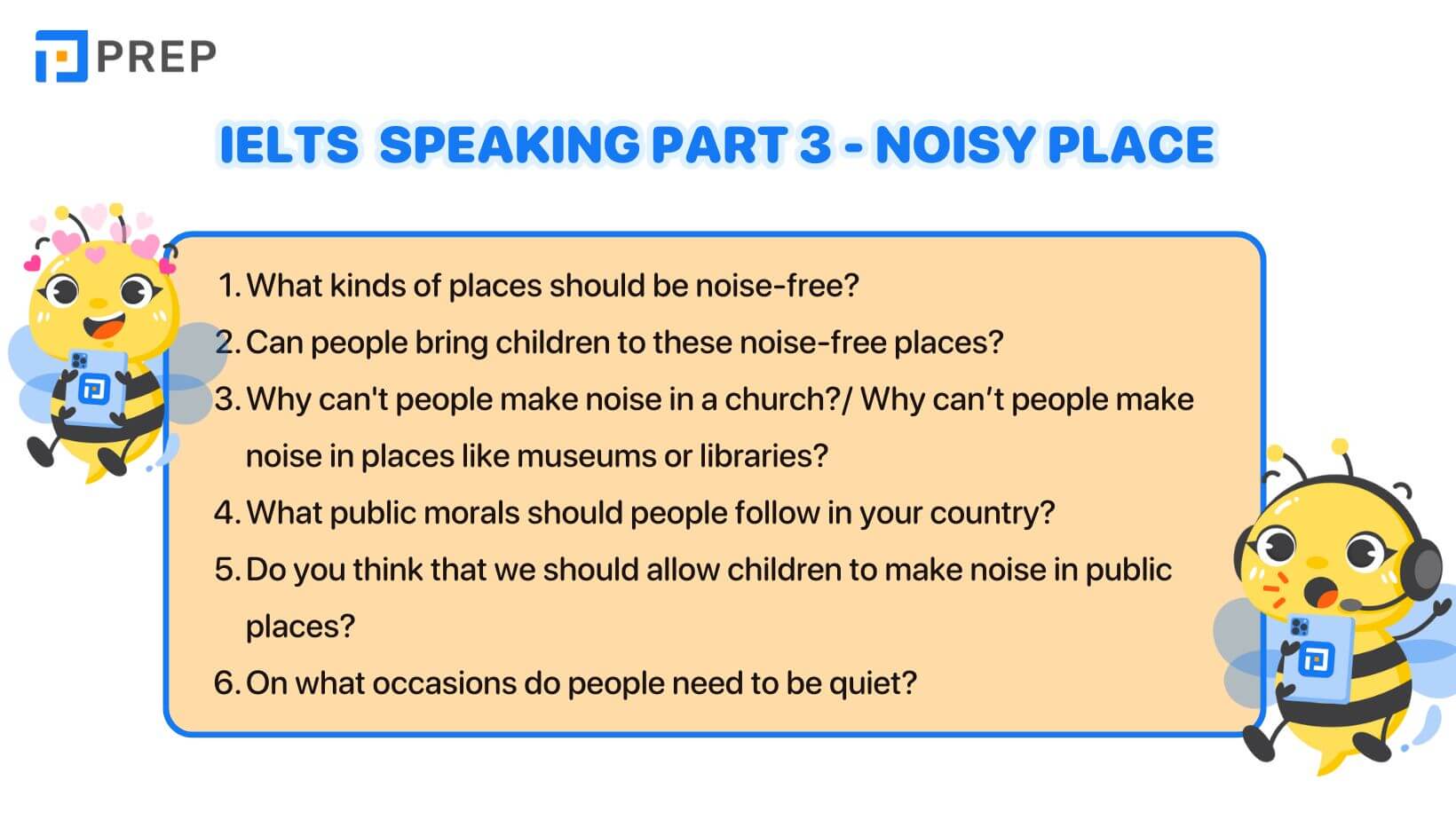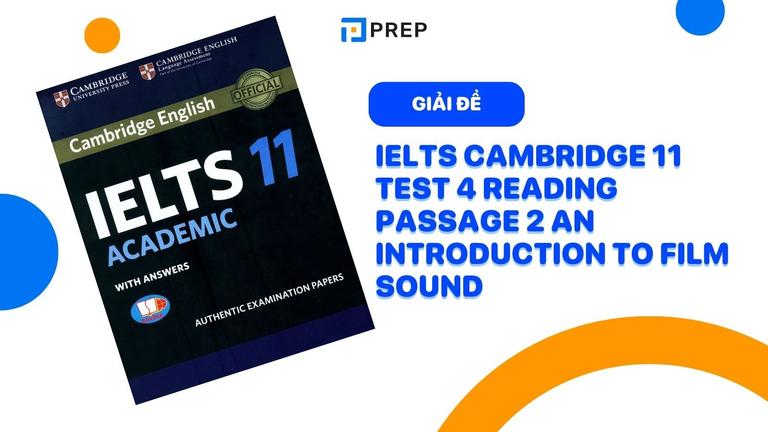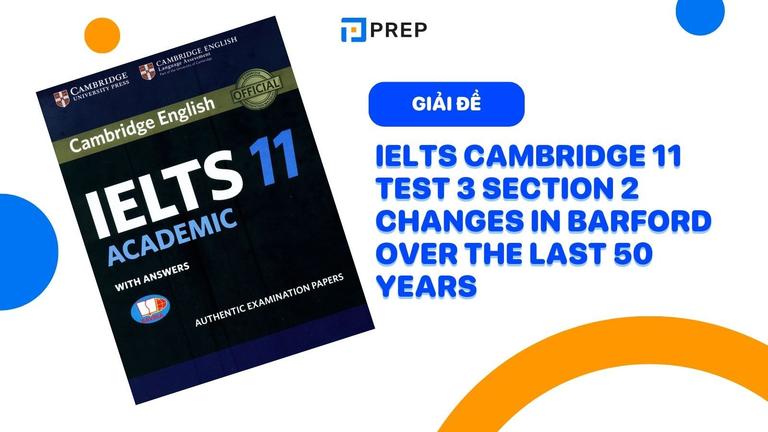Tổng hợp IELTS Speaking Part 3 Noisy place
Noisy place là chủ đề thường xuyên xuất hiện trong bài thi IELTS Speaking Part 3. Ở bài viết hôm nay, hãy cùng PREP tìm hiểu danh sách câu hỏi, câu trả lời cùng từ vựng hay sử dụng trong IELTS Speaking Part 3 Noisy place bạn nhé!
- II. Câu trả lời mẫu IELTS Speaking Part 3 Noisy place
- 1. What kinds of places should be noise-free?
- 2. Can people bring children to these noise-free places?
- 3. Why can't people make noise in a church?/ Why can’t people make noise in places like museums or libraries?
- 4. What public morals should people follow in your country?
- 5. Do you think that we should allow children to make noise in public places?
- 6. On what occasions do people need to be quiet?
- III. Học IELTS Speaking Part 3 cùng phòng luyện Nói ảo VSR

Dưới đây PREP xin chia sẻ danh sách câu hỏiIELTS Speaking Part 3 Noisy place thông dụng nhé!
- What kinds of places should be noise-free?
- Can people bring children to these noise-free places?
- Why can't people make noise in a church?/ Why can’t people make noise in places like museums or libraries?
- What public morals should people follow in your country?
- Do you think that we should allow children to make noise in public places?
- On what occasions do people need to be quiet?

II. Câu trả lời mẫu IELTS Speaking Part 3 Noisy place
Cùng PREP tìm hiểu nhanh các câu hỏi nằm trong IELTS Speaking Part 3 Noisy place và các speaking Part 3 IELTS sample answer bạn nhé!
1. What kinds of places should be noise-free?
The place I think of first is libraries. These are spaces for reading, studying, and concentration. Maintaining a noise-free or quiet atmosphere is essential to allow patrons to focus on their work or reading materials. Moreover, churches, temples, mosques, and meditation centers should provide a serene and noise-free environment to facilitate prayer, meditation, and reflection. All in all, it's essential to strike a balance between noise-free spaces and those that allow for social interaction and communication. Noise regulations and policies can help maintain appropriate noise levels in these environments.
Từ vựng hay sử dụng trong IELTS Speaking Part 3 Noisy place:
- Concentration (n): Sự tập trung
- Patrons (n): Khách hàng, người bảo trợ
- Serene (adj): Thanh bình, tĩnh lặng
- Strike a balance between (v): Đạt được sự cân bằng giữa
- Maintain (v): Duy trì, bảo trì
2. Can people bring children to these noise-free places?
While many noise-free places are intended to maintain a peaceful and quiet environment, the acceptability of bringing children to these places can vary depending on the specific location and its rules or policies. For example, most libraries have designated children's sections or areas where kids can read and study. Parents are encouraged to accompany their children and teach them the importance of keeping noise to a minimum in other library areas. Thus, places of worship generally welcome families and children. Parents should ensure that their children are well-behaved and respectful of the sacred space and the worshippers.
Từ vựng hay sử dụng trong IELTS Speaking Part 3 Noisy place:
- Noise-free (adj): Không có tiếng ồn
- Acceptability (n): Sự chấp nhận được, sự được chấp thuận
- Designated (adj): Được chỉ định, được định rõ
- Worshippers (n): Tín đồ, người thờ cúng
3. Why can't people make noise in a church?/ Why can’t people make noise in places like museums or libraries?
The expectation of maintaining a quiet and reverent atmosphere in a church is rooted in religious and cultural traditions. Churches are places of worship and are considered sacred by many religious denominations. Silence is seen as a way to show reverence and respect for the presence of the divine or the sanctity of the space. Moreover, many individuals visit churches for prayer, meditation, and reflection. Silence allows them to focus on their spiritual connection, seek solace, and engage in meaningful communion with their beliefs. It’s not a full list of all the reasons but they are the main ones.
Từ vựng hay sử dụng trong IELTS Speaking Part 3 Noisy place:
- Reverent (adj): Tôn kính, kính trọng
- Denominations (n): Giáo phái, tôn giáo
- Reverence (n): Sự tôn kính, sự kính trọng
- Spiritual (adj): Thuộc về tinh thần, thuộc về tôn giáo
4. What public morals should people follow in your country?
Societal norms can vary from one country to another, and they can change over time. Generally speaking, showing respect to older individuals is highly valued in Vietnamese culture. This includes using appropriate forms of address and practicing deference in interactions. Moreover, Vietnamese people are known for their hospitality and welcoming nature. Offering guests food and beverages, even in casual settings, is a common practice. An interesting fact is that while punctuality is important in professional settings, social gatherings and meetings with friends can sometimes have a more relaxed approach to time.
What is considered morally acceptable can also be influenced by personal beliefs and societal changes so it's advisable for visitors to respect and observe local customs and values when in Vietnam or any foreign country.
Từ vựng hay sử dụng trong IELTS Speaking Part 3 Noisy place:
- Norms (n): Chuẩn mực, quy tắc
- Deference (n): Sự tôn trọng, sự kính trọng
- Hospitality (n): Lòng hiếu khách
- Beverages (n): Đồ uống
- Punctuality (n): Sự đúng giờ
- Acceptable (adj): Chấp nhận được
- Observe (v): Quan sát, tuân thủ
5. Do you think that we should allow children to make noise in public places?
I think this should be contingent upon each situation or context. While allowing them to be natural and express what they want is crucial, instilling consideration for others is equally important. For example, it's quite free for young folks to roam free and shout their lungs out with their friends in a playground or in a park where they can play on rides or games, etc. But coming into a public area where privacy and respect for others should be kept, like on board of a plane or in an office, parents or responsible adults
should now let them make too much noise.
Từ vựng hay sử dụng trong IELTS Speaking Part 3 Noisy place:
- Contingent (adj): Phụ thuộc vào, tùy thuộc vào
- Roam (v): Đi lang thang
- Public area (n): Khu vực công cộng
- Respect (v): Tôn trọng
6. On what occasions do people need to be quiet?
Instances requiring silence vary, such as during solemn ceremonies, religious services, or educational settings like libraries. Maintaining quietude is essential for respectful participation and concentration in these environments. While the need for silence is clear, hesitation may surface when individuals grapple with competing priorities, like enforcing discipline in shared spaces without stifling individual expression.
Từ vựng hay sử dụng trong IELTS Speaking Part 3 Noisy place:
- Ceremonies (n): Các nghi lễ, lễ hội
- Quietude (n): Sự yên tĩnh, tĩnh lặng
- Hesitation (n): Sự do dự, ngập ngừng
- Enforcing (v): Thực thi, bắt buộc
- Stifling (adj): Ngột ngạt, khó chịu
Tham khảo thêm bài mẫu:
- Bài mẫu IELTS Speaking Part 1 chủ đề: Noise
- Bài mẫu IELTS Speaking Part 2, 3 chủ đề: Describe a quiet place
III. Học IELTS Speaking Part 3 cùng phòng luyện Nói ảo VSR
Tại phòng luyện Nói ảo VSR của PREP, bạn sẽ được trải nghiệm những tính năng đặc biệt mà chỉ có tại VSR:
- Phòng luyện VSR IELTS của PREP ứng dụng công nghệ độc quyền trong việc chấm chữa lỗi sai giúp học viên có thể phát hiện lỗi sai ngay tập tức và cải thiện trình độ nhanh chóng.
- Kết quả chấm chữa VSR IELTS tại Prep bám sát theo các tiêu chí chấm chữa IELTS Speaking, điều này giúp học viên có thể nâng cao trình độ hiệu quả ở từng tiêu chí. Đây chính là điểm khác biệt của PREP, dẫn đầu trên nền tảng luyện thi online hiện nay mà chưa đơn vị nào khác thực hiện được.
- Cung cấp nhiều bộ đề luyện Speaking hot nhất, mới nhất, bao gồm những chủ đề thường gặp trong kỳ thi IELTS. Luyện đề kèm theo đọc chi tiết bài mẫu, trau dồi nhiều idea, xây dựng kho ý tưởng riêng để tránh tình trạng bí idea mỗi khi viết.
Còn chần chừ gì nữa mà chưa ấn vào link dưới đây để luyện IELTS Speaking Part 3 Noisy place hiệu quả nhé!
Trên đây PREP đã cung cấp cho bạn đầy đủ câu trả lời hay nằm trong IELTS Speaking Part 3 Noisy place. Thường xuyên theo dõi PREP để cập nhật thêm nhiều kiến thức tiếng Anh chất lượng bạn nhé!

Chào bạn! Mình là Hiền Hoàng, hiện đang đảm nhận vai trò quản trị nội dung sản phẩm tại Blog của website prepedu.com.
Với hơn 5 năm tự học các ngoại ngữ như tiếng Anh, tiếng Trung và ôn luyện một số kỳ thi IELTS, TOEIC, HSK, mình đã tự đúc rút được nhiều kinh nghiệm để hỗ trợ hàng nghìn người đang gặp khó khăn trong việc học ngoại ngữ. Hy vọng rằng những chia sẻ phía trên sẽ giúp ích cho bạn trong quá trình tự ôn luyện thi hiệu quả tại nhà!
Bình luận
Nội dung premium
Xem tất cảLộ trình cá nhân hoá
Có thể bạn quan tâm
Kết nối với Prep

MSDN: 0109817671.
Địa chỉ liên hệ: Tòa nhà Vinaconex, 34 Láng Hạ, phường Láng, TP Hà Nội.
Trung tâm CSKH tại HN: Lô 21 C2 Khu đô thị Nam Trung Yên, phường Yên Hòa, TP Hà Nội.
Trung tâm CSKH tại HCM: 288 Pasteur, Phường Xuân Hòa, TP Hồ Chí Minh
Trụ sở Công ty: Số nhà 20, ngách 234/35 đường Hoàng Quốc Việt, phường Nghĩa Đô, TP Hà Nội.
Phòng luyện ảo - Trải nghiệm thực tế - Công nghệ hàng đầu.
Hotline: 0931 42 8899.
Trụ sở Công ty: Số nhà 20, ngách 234/35 đường Hoàng Quốc Việt, phường Nghĩa Đô, TP Hà Nội.
Giấy chứng nhận hoạt động đào tạo, bồi dưỡng số 1309/QĐ-SGDĐT ngày 31 tháng 07 năm 2023 do Sở Giáo dục và Đào tạo Hà Nội cấp.

























